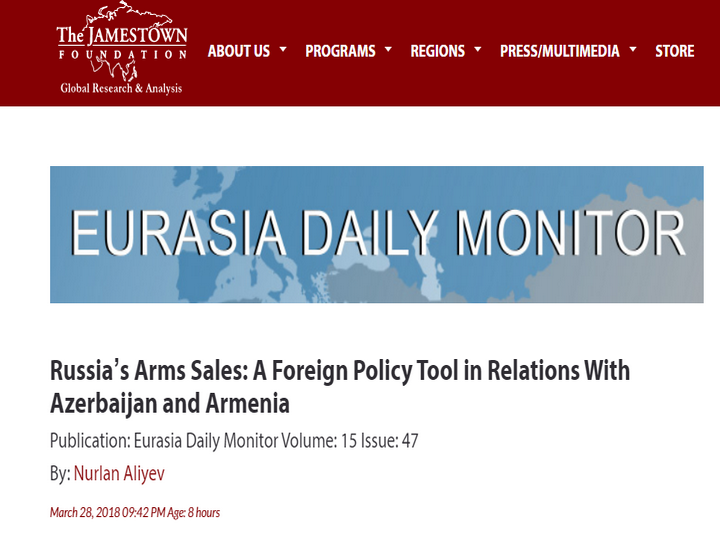Russia’s Arms Sales: A Foreign Policy Tool in Relations With Azerbaijan and Armenia

Publication: Eurasia Daily Monitor Volume: 15 Issue: 47
By: Nurlan Aliyev
During his recent visit to Yerevan, the chair of the Foreign Affairs Committee of the Federation Council of Russia, Konstantin Kosachev, stated that Russian weapons sales to Azerbaijan are carried out within the framework of agreements that were reached prior to the so-called “four days war.” But he added that Russia “is undoubtedly reacting to the situation that took place in April 2016” and, therefore, arms sales to Azerbaijan will be curtailed somewhat in the future (Tert.am, March 14). Kosachev is a professional diplomat; since the 1980s, he has held several high-level positions in Russia’s foreign policy institutions. As such, his comments in Yerevan were almost certainly not made on his own initiative. Most likely, Kosachev’s statement was meant to indirectly convey the Kremlin’s confusing messaging in order for Russia to gain some advantage in its relations with Armenia or with Azerbaijan.
Russia has long been Azerbaijan’s main arms supplier. Between 2013 and 2017, its share was 65 percent of Azerbaijan’s total foreign weapons imports (Sipri.org, March 2018). Although Russia is the main arms seller to Azerbaijan, it also provides military equipment to Armenia. Notably, in 2016, Armenia obtained Russian Iskander (SS-26 Stone) short-range, mobile ballistic missile systems, which increased dissatisfaction with Moscow within Azerbaijani society and its political establishment (Vedomosti, September 18, 2016; Azernews.az, May 30, 2017). Such facts also provided impetus to Baku to try to diversify its channels of arms imports. Hence, Azerbaijan has been increasing its collaboration with Israel, Belarus, Turkey, Ukraine, Czechia (Czech Republic) and other arms importers in recent years. Baku is particularly interested in importing from abroad advanced multiple-launch rocket systems (MLRS) and surface-to-surface missiles (Armyrecognition.com, February 4; Virtualaz.org, January 7; Belta.by, October 9, 2017; Azvision.az, October 28, 2017; Armadninoviny.cz, September 22, 2017).
Losing or even downgrading Azerbaijan as a key arms export market would not only be economically detrimental to Moscow but also politically unfavorable. In conjunction with controlling the negotiation process on the Armenian-Azerbaijani conflict over Karabakh, Moscow exploits its role as a major supplier of weapons to Azerbaijan in order to maintain its influence over Baku. In this realm, Russia plays a unique role between Azerbaijan and Armenia. As a main arms supplier of both, Moscow is also the main power broker between the two South Caucasus rivals.
Since 2016, Russia has mediated several meetings between high-level officials from Azerbaijan and Armenia on the settlement of the Karabakh conflict. But there have not been any significant results. Russia has its own interests when it comes to the conflict. Russia sells arms to Azerbaijan, but it also supplies weaponry to Armenia on long-term credit. By selling weapons to Azerbaijan while simultaneously providing defense guarantees to Armenia, the Kremlin retains the ability to influence the continued escalation/de-escalation cycles in the conflict. This strong position inevitably translates into Russia being the primary and most influential outsider when it comes to shaping the tensions between Baku and Yerevan. Moreover, this strong regional position and resultant political influence allows Moscow to more easily prevent the North Atlantic Treaty Organization (NATO) from pursuing a deeper cooperative security footprint in the South Caucasus (Nato.int, December 7, 2017). Likewise, the Kremlin is trying to block the Alliance from possibly extending its influence into the neighboring Caspian basin. Therefore, any development of military cooperation between Azerbaijan and the West or other third countries is never welcomed in Moscow (see EDM, November 2, 2017).
Additionally, Moscow is trying to maintain the status quo in the Karabakh conflict as a part of its strategy to support a broader buffer of “gray” zones (Donbas in Ukraine, Transnistria in Moldova, and Abkhazia and South Ossetia in Georgia) between Russia and the West. Moscow will also occasionally try to exploit these conflicts in an effort to improve its relations with the United States and Europe. As Russia’s Foreign Minister Sergei Lavrov indirectly recognized, “I am convinced that if equal indivisible security [an old Russian proposal that would effectively give it a veto over NATO and push the US out of continental security affairs—see EDM, June 9, 2008] really took on a legally binding form, many conflicts that are now preserved in Europe would have been settled long ago.” According to him, this concerns, first of all, the Karabakh and Transnistrian conflicts. And had the West agreed to Moscow’s proposed security framework in Europe, “the Ukrainian crisis would not exist at all” (TASS, September 1, 2017). Moscow’s vision for resolving Eurasia’s “frozen conflicts” was even more precisely defined by Sergey Glazyev, an advisor to President Vladimir Putin. According to him, to achieve peace in the Caucasus, “we need to integrate the entire Caucasus into the Eurasian Union” (YouTube, October 6, 2017).
Russia will almost certainly continue to design new security dilemmas for Azerbaijan and Armenia in order to retain its control over the two rivals and influence the Karabakh conflict based on Moscow’s own interests. Therefore, despite recent official statements suggesting Russia would reevaluate its status as the main arms exporter to both Azerbaijan and Armenia, such talk is unlikely to be matched by a significant change in policy by Moscow.














